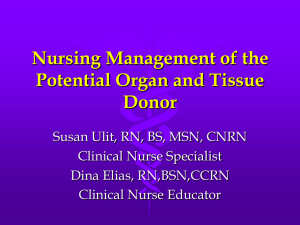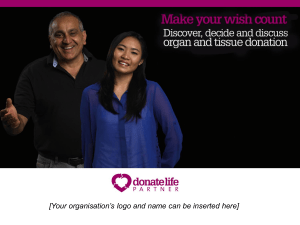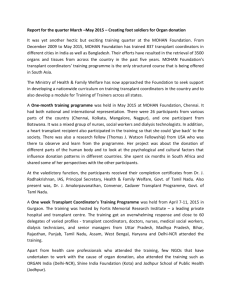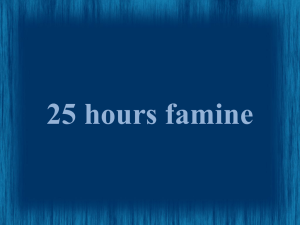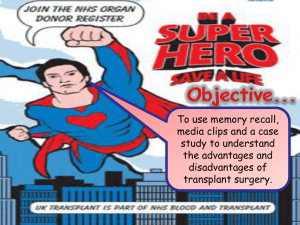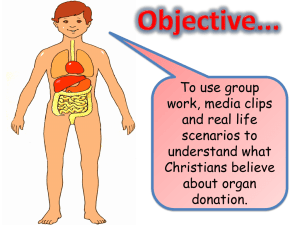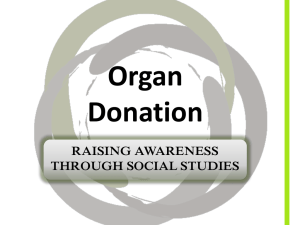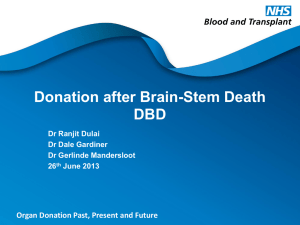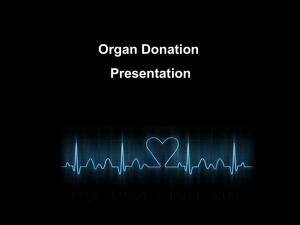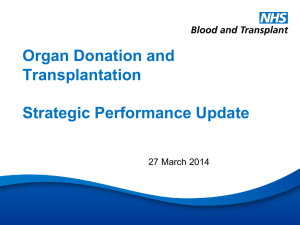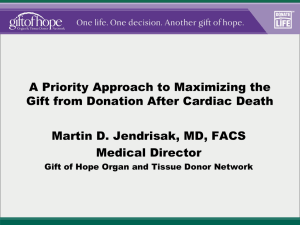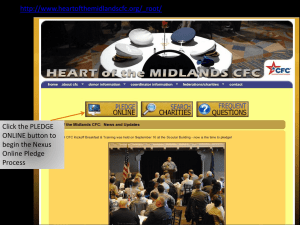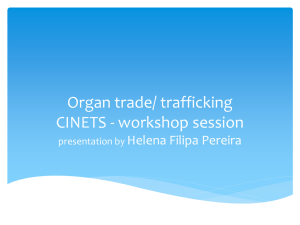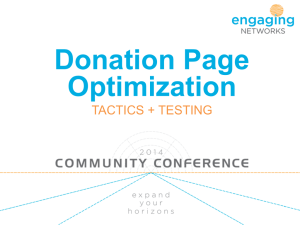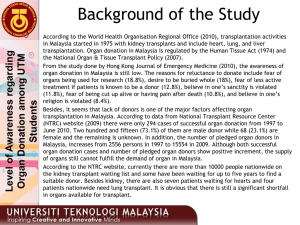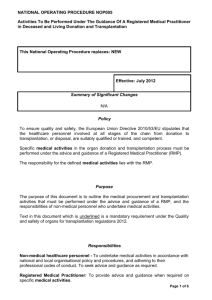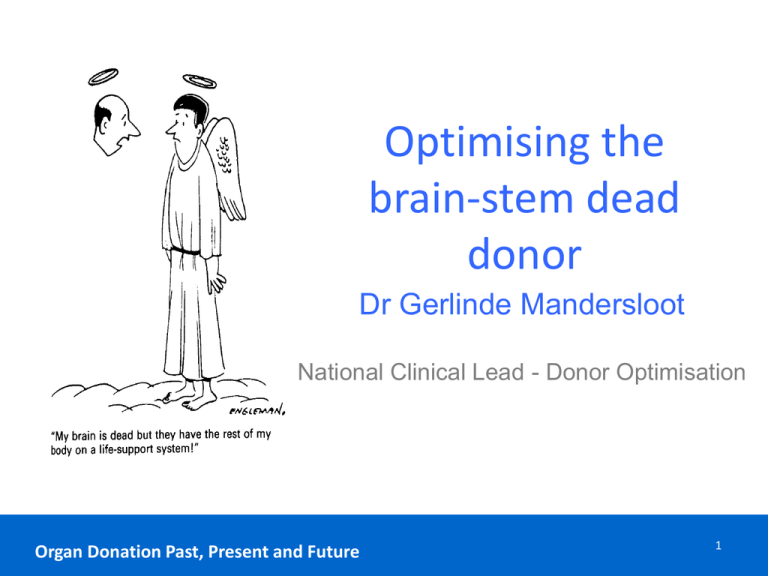
Optimising the
brain-stem dead
donor
Dr Gerlinde Mandersloot
National Clinical Lead - Donor Optimisation
Dr Gerlinde Mandersloot
20th April 2012
Organ Donation Past, Present and Future
1
Challenges
• Physiological consequences of BSD
Organ Donation Past, Present and Future
4
‘Collateral damage’
• Hormonal
• Diabetes insipidus
• Hypovolaemia
• Hypernatraemia
• T3 / T4 reduces
• ACTH
• Blood glucose
• Hypothermia
Organ Donation Past, Present and Future
5
Incidence of organ involvement
• Hypotension
81%
• Diabetes insipidus
65%
• DIC
28%
• Cardiac dysrhythmias
25%
• Pulmonary oedema
18%
• Metabolic acidosis
11%
J Heart Lung Transplantation 2004 (suppl)
Organ Donation Past, Present and Future
6
Challenges
• Physiological consequences of BSD
• Stabilisation and brainstem death testing
Organ Donation Past, Present and Future
7
Stabilisation of a patient to
facilitate neurological examination
• Difficulties in defining futility, especially in survivors
• Replace by concept of ‘Best Interests’
•
Not only medical factors taken into account
• Stabilisation of patient prior to BSD testing
•
Brainstem death testing is part of a neurological examination of the patient
•
•
•
Clinical in the majority of cases
Ancillary tests where required
Active management may be necessary in order to examine accurately
• Continued care after BSD to explore possibility of
donation
• Integral part of every End of Life Care Plan
Challenges
• Physiological consequences of BSD
• Stabilisation and brainstem death testing
• Consistent donor optimisation
• 65% of units have 2 or fewer donor per year
• 23% of donors are from these units
• Only 4% units have 10 or more donor per year, 28% of the total donor
population
Organ Donation Past, Present and Future
9
Decent perfusion, good
Just get
with
it!! only
gases
andonBP,
it can
get worse
Lots of fluid please
-better function
I’d like 10-12
earlier
Give me a CVP of 6-10
Make sure they aren’t
hypovolaemic, please
Fluid overload is a
problem for us-if
Too
than 6
wemuch-less
get goals with
less that’s good
Evidence
• Totsuka Transplant Proc. 2000; 32;322-326
• High sodium in liver donor doubles graft loss
• Rosendale Transplantation 2003. 75 (4): 482-487
• Protocol increased organs per donor 3.1 to 3.8. Increased probability of transplant
• Snell J Heart Lung Transplant 2008;27:662-7
• 54% of Australian lung donations used for transplant vs. 13% in UK
Organ Donation Past, Present and Future
11
Organ Donation Past, Present and Future
12
Organ Donation Past, Present and Future
13
Unifying practice across the UK
• Optimisation tool
•
•
•
•
•
Non-controversial (or not too controversial)
Not too complicated
One side of an A4 ?
Buy-in from retrieval / transplant community
Easy to audit
• Extended Care Bundle with two components
• Prescription: medical staff
• Implementation
• Critical care nurses
• SN-ODs
• ‘Scouts’
• Monitoring implementation
Organ Donation Past, Present and Future
14
Organ Donation Past, Present and Future
15
Organ Donation Past, Present and Future
16
Priorities, if not already addressed
• Assess fluid status and correct hypovolaemia with fluid boluses
as required
• Perform lung recruitment manoeuvre(s) as at risk of atelectasis
following apnoea tests
• Identify, arrest and reverse effects of Diabetes insipidus
• Introduce vasopressin infusion: reduces Norepinephrine
requirements and treats DI
• Methylprednisolone, 15 mg/kg to max of 1g, as soon as
possible
Organ Donation Past, Present and Future
17
Hormonal treatment
• Vasopressin
• Reduction in other vaso-active drugs
• Dose: 1 – 4 units/h (can start with boluses of 1 unit at a time)
• Liothyronine (T3)
• No clear evidence for use
• May add haemodynamic stability in very unstable donor
• Dose: 3 units/h, sometimes bolus of 4 units asked for by retrieval team
• Methylprednisolone in all cases
• Dose: 15 mg/kg up to 1g
• Insulin
• At least 1 unit/h (occasionally may need to add glucose infusion)
• ‘Tight’ glycaemic control (4 - 10 mmol/l)
Organ Donation Past, Present and Future
18
Organ Donation Past, Present and Future
19
Monitoring optimisation
• Implementation: use of care bundle
• Adherence easy to monitor
• Audit first 5 priorities
• Results of optimisation evaluated
• Number of organs retrieved
• Increase in cardiothoracic organs retrieved
• Quality of organs: graft function in recipients
• Delayed graft function
• Quality: biomarkers
• Duration of graft function: long term project
Organ Donation Past, Present and Future
20


